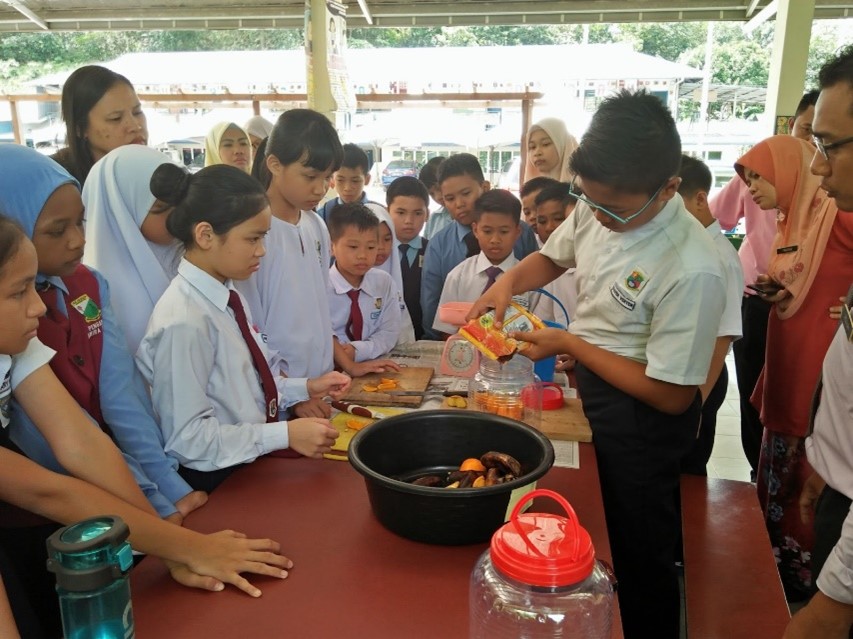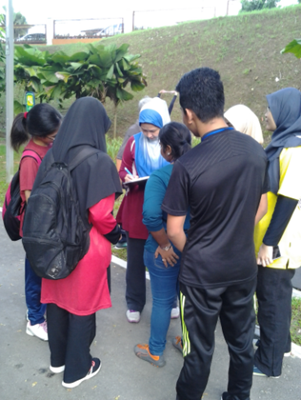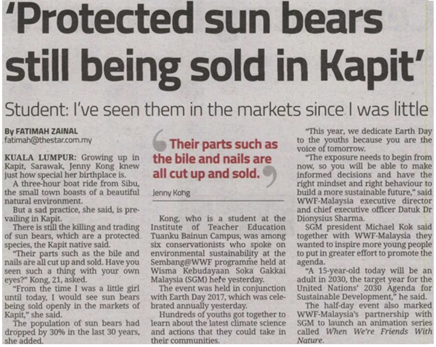
【Case Sharing】Education for Sustainable Development at WWF-Malaysia - shared by Thiagarajan Nadeson
Arthor: Mathi Vathani R. Gunasegaran
Editor: Thiagarajan Nadeson
Introduction
Malaysia is recognized as one of the top twelve mega-biodiversity countries in the world. However, the increasing dependency of resources for the pursuit of economic growth poses many threats to these resources and the people who depend on them. With the growing population and limited natural resources, we need to learn how to live together sustainably. Therefore, the Education for Sustainable Development (ESD) programme was adopted by WWF-Malaysia to empower students, youths and educators to transform the way they think and work towards a sustainable future.
ESD is a combination of innovative educational approaches to ingrain environmental citizenship values into the formal education society. Under the ESD, we have the Eco-Schools Programme, which is the world’s largest sustainable school programme. It uses the whole school approach to encourage actions for environmental issue. Started in 2011, the programme is supported by Ministry of Education, Malaysia, government agencies, environmental partners and tertiary institutions. Currently, we have more than 300 schools signed up for the Eco-Schools Programme.
To complement the Eco-Schools programme, the FEE EcoCampus Programme was also introduced with its focus on tertiary institutions students to allow the continuity of the schools students at the higher educational level. It was initially introduced in 2011 as Eco-Institutes (focusing on teacher trainees from Teacher Education Institutes) and rebranded to FEE EcoCampus in 2017 and currently have twenty-five campuses under the programme.
The ESD programme is aligned to Sustainable Development Goals, where it’s target is by 2030, an improved enabling environment is created to ensure that youths, students, communities and local authorities adopt sustainable practices and lifestyle through education and learning, contributing towards Sustainable Development Goal's Target 4.7.
The indicator for Goal 4.7 which includes” (i) global citizenship education and (ii) education for sustainable development, including gender equality and human rights, are mainstreamed at all levels in: (a) national education policies, (b) curricula, (c) teacher education and (d) student assessment” are the main emphasis by the Eco-Schools and FEE EcoCampus programmes.
The ESD programme, particularly Eco-Schools and FEE EcoCampus Programmes is also aligned to SDG(s) through the ten themes which are water, waste management, energy, school grounds, biodiversity and nature, Local Agenda 21, global citizenship, healthy living, transport and climate change.
Impact
The Eco-Schools Programme and FEE EcoCampus Programmes provide a framework for schools and tertiary institutions to integrate sustainability as part of their daily lives. Throughout these years, we have witnessed the growth of schools and campuses. Majority of the schools and campuses has practiced environmental actions and share the initiatives with their peers and family members. Schools and campuses have also shown initiatives to collaborate with other schools, campuses, and even local communities for river cleanups and urban gardens. Some of the initiatives implemented jointly with our stakeholders are:
1. Practice environmental actions in school/campus
- Usage of FSC paper / recycled papers
- Reuse fruit peels into Bio-enzyme cleaners
- Producing biodegradable products
- Recycle oil into soap
- Compost using food waste
- Controlled usage of electrical appliances
- Rainwater harvesting for garden
- Build urban garden
2. Organise knowledge sharing sessions
- Reduce and Refuse Single Use Plastic
- Say No to Shark Fin Pledge drive
- Zero Polystyrene Campaign
- Food wastage reduction campaign
- Dengue Awareness
3. Collaboration with organisation
- Clean ups around neighborhood and river
- Community Garden and tree planting
- Upcycling Workshops with communities

Image 1: Youths getting public members to sign for Say no to Shark Fin Pledge.
Students and youths also used their voice to raise awareness on conservation issues through another initiative known as Sembang@WWF, a bilingual story-telling platform for us to listen and share ideas on what we can do as individuals to make informed decisions. One of the youth participated in the event highlighted the sale of Sun Bear in the local market in Sarawak which was captured in the local media. A few of them also took part in pledging against shark fin consumption campaign.

Image 2: Media coverage on topics covered during SEMBANG@WWF
Conclusion
All these initiatives are aligned to SDGs especially in reducing consumption and production and carbon footprint. Students and educators are empowered to take actions towards making environmentally conscious choices. It is our hope these younger generations that has undergone our programme will continue to be the voice and take action in becoming the next generation of innovative and forward thinking future leaders.
-- about Advisory Committee Meeting
-- Case sharing from other countries
Editor: Thiagarajan Nadeson
Introduction
Malaysia is recognized as one of the top twelve mega-biodiversity countries in the world. However, the increasing dependency of resources for the pursuit of economic growth poses many threats to these resources and the people who depend on them. With the growing population and limited natural resources, we need to learn how to live together sustainably. Therefore, the Education for Sustainable Development (ESD) programme was adopted by WWF-Malaysia to empower students, youths and educators to transform the way they think and work towards a sustainable future.
ESD is a combination of innovative educational approaches to ingrain environmental citizenship values into the formal education society. Under the ESD, we have the Eco-Schools Programme, which is the world’s largest sustainable school programme. It uses the whole school approach to encourage actions for environmental issue. Started in 2011, the programme is supported by Ministry of Education, Malaysia, government agencies, environmental partners and tertiary institutions. Currently, we have more than 300 schools signed up for the Eco-Schools Programme.
To complement the Eco-Schools programme, the FEE EcoCampus Programme was also introduced with its focus on tertiary institutions students to allow the continuity of the schools students at the higher educational level. It was initially introduced in 2011 as Eco-Institutes (focusing on teacher trainees from Teacher Education Institutes) and rebranded to FEE EcoCampus in 2017 and currently have twenty-five campuses under the programme.
The ESD programme is aligned to Sustainable Development Goals, where it’s target is by 2030, an improved enabling environment is created to ensure that youths, students, communities and local authorities adopt sustainable practices and lifestyle through education and learning, contributing towards Sustainable Development Goal's Target 4.7.
The indicator for Goal 4.7 which includes” (i) global citizenship education and (ii) education for sustainable development, including gender equality and human rights, are mainstreamed at all levels in: (a) national education policies, (b) curricula, (c) teacher education and (d) student assessment” are the main emphasis by the Eco-Schools and FEE EcoCampus programmes.
The ESD programme, particularly Eco-Schools and FEE EcoCampus Programmes is also aligned to SDG(s) through the ten themes which are water, waste management, energy, school grounds, biodiversity and nature, Local Agenda 21, global citizenship, healthy living, transport and climate change.
Impact
The Eco-Schools Programme and FEE EcoCampus Programmes provide a framework for schools and tertiary institutions to integrate sustainability as part of their daily lives. Throughout these years, we have witnessed the growth of schools and campuses. Majority of the schools and campuses has practiced environmental actions and share the initiatives with their peers and family members. Schools and campuses have also shown initiatives to collaborate with other schools, campuses, and even local communities for river cleanups and urban gardens. Some of the initiatives implemented jointly with our stakeholders are:
1. Practice environmental actions in school/campus
- Usage of FSC paper / recycled papers
- Reuse fruit peels into Bio-enzyme cleaners
- Producing biodegradable products
- Recycle oil into soap
- Compost using food waste
- Controlled usage of electrical appliances
- Rainwater harvesting for garden
- Build urban garden
2. Organise knowledge sharing sessions
- Reduce and Refuse Single Use Plastic
- Say No to Shark Fin Pledge drive
- Zero Polystyrene Campaign
- Food wastage reduction campaign
- Dengue Awareness
3. Collaboration with organisation
- Clean ups around neighborhood and river
- Community Garden and tree planting
- Upcycling Workshops with communities

Image 1: Youths getting public members to sign for Say no to Shark Fin Pledge.
Students and youths also used their voice to raise awareness on conservation issues through another initiative known as Sembang@WWF, a bilingual story-telling platform for us to listen and share ideas on what we can do as individuals to make informed decisions. One of the youth participated in the event highlighted the sale of Sun Bear in the local market in Sarawak which was captured in the local media. A few of them also took part in pledging against shark fin consumption campaign.

Image 2: Media coverage on topics covered during SEMBANG@WWF
Conclusion
All these initiatives are aligned to SDGs especially in reducing consumption and production and carbon footprint. Students and educators are empowered to take actions towards making environmentally conscious choices. It is our hope these younger generations that has undergone our programme will continue to be the voice and take action in becoming the next generation of innovative and forward thinking future leaders.
-- about Advisory Committee Meeting
-- Case sharing from other countries
